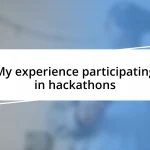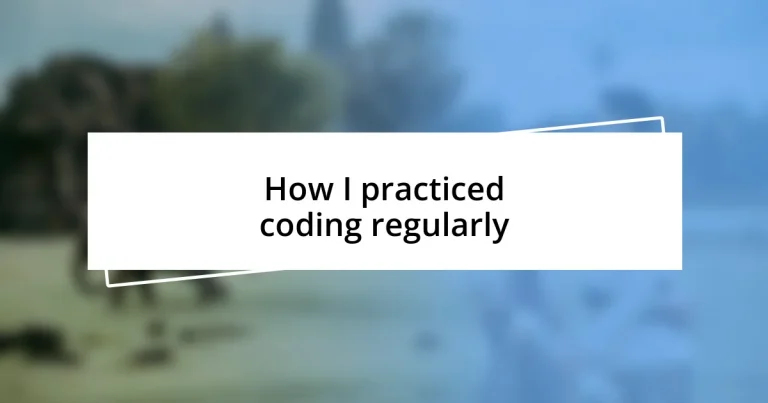Key takeaways:
- Establishing a daily coding routine fosters consistency and discipline, making coding a more enjoyable habit over time.
- Setting achievable, incremental goals boosts confidence and allows for the celebration of progress, with emphasis on tracking accomplishments.
- Engaging with coding communities offers support, diverse problem-solving perspectives, and opportunities for mentorship, enhancing the learning experience.
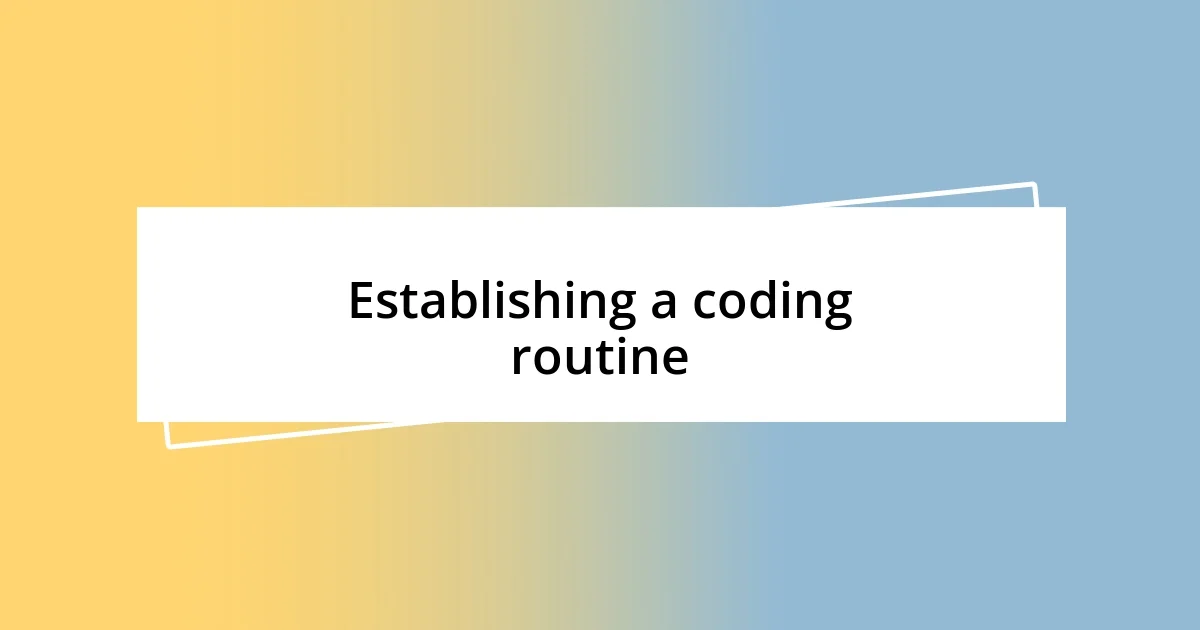
Establishing a coding routine
One of the most transformative steps I took in my coding journey was setting aside a specific time each day dedicated solely to practice. I remember vividly how, early on, I chose the early mornings when my mind felt fresh and clear. It became my sacred time, just me and my laptop, working through challenges and learning at my own pace.
I found that consistency was key. Initially, it felt tedious, almost like a chore, but over time, I started to look forward to those coding sessions. Have you ever experienced that spark of excitement when tackling a new problem? It’s exhilarating, and it motivates me to keep pushing forward. That routine helped me craft my identity as a coder, instilling a sense of discipline I hadn’t felt before.
Sometimes, life gets hectic, and maintaining that routine was a challenge. However, I learned to be flexible, allowing room for adjustments without abandoning my practice altogether. For instance, if I missed a morning, I’d make it a point to code for at least 15 minutes during lunch. It helped me realize that every little effort counts—what about you? Have you found ways to keep your coding practice alive amid life’s demands?
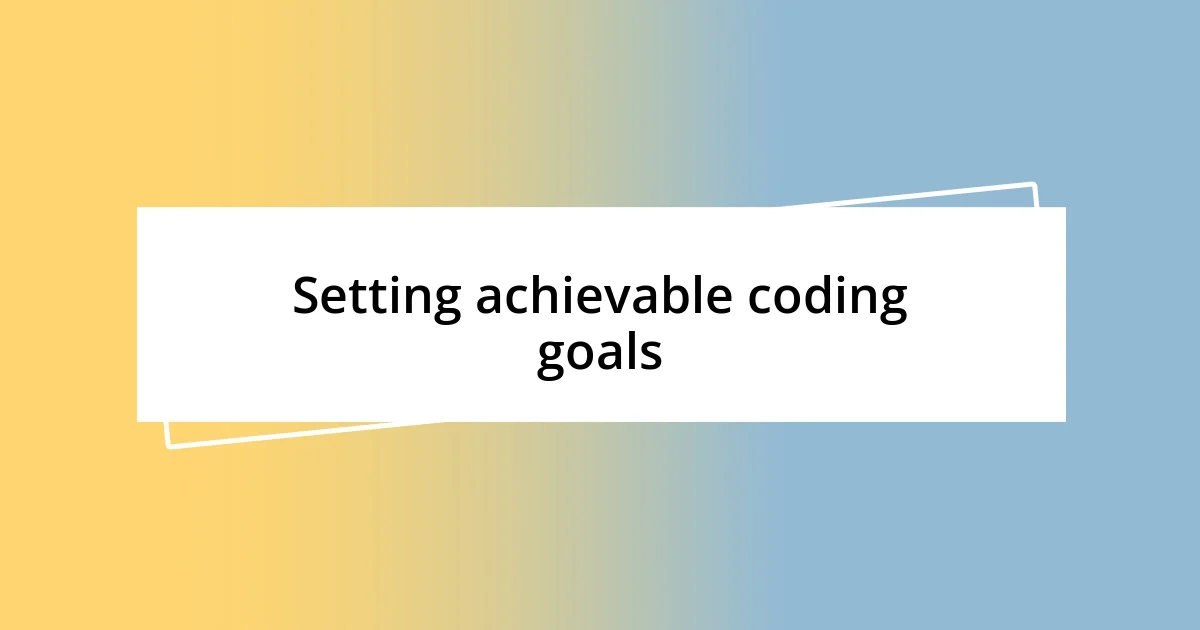
Setting achievable coding goals
Setting achievable coding goals has been a game changer for me. When I first started, I remember setting these grand, ambitious targets, like wanting to develop an entire app in a week. Sounds exciting, right? But honestly, it felt overwhelming and often led to frustration. I quickly learned that breaking down those big dreams into smaller, more manageable tasks was key. This not only made those goals feel realistic but also allowed me to celebrate small victories along the way, boosting my confidence.
I started with tiny, specific goals, like completing one coding challenge each day or learning a new function in a programming language. I recall one day I was struggling with arrays. Instead of tackling a massive project, I focused on understanding just that one concept. It felt like a light bulb moment, and I could see tangible progress in my skills. These incremental successes taught me that every little step forward is a part of the journey, reinforcing my passion for coding even further.
It’s important to track your progress too. I often keep a simple journal noting what I accomplished each week. There’s something so rewarding about looking back and seeing how far I’ve come! Have you tried tracking your goals? It might surprise you to see the progress you’ve made and inspire you to set even more ambitious targets in the future.
| Goal Type | Description |
|---|---|
| Short-Term | Focus on daily or weekly tasks like solving one coding challenge. |
| Medium-Term | Aim for project completion in a month, such as building a small website. |
| Long-Term | Master a programming language or framework over six months. |
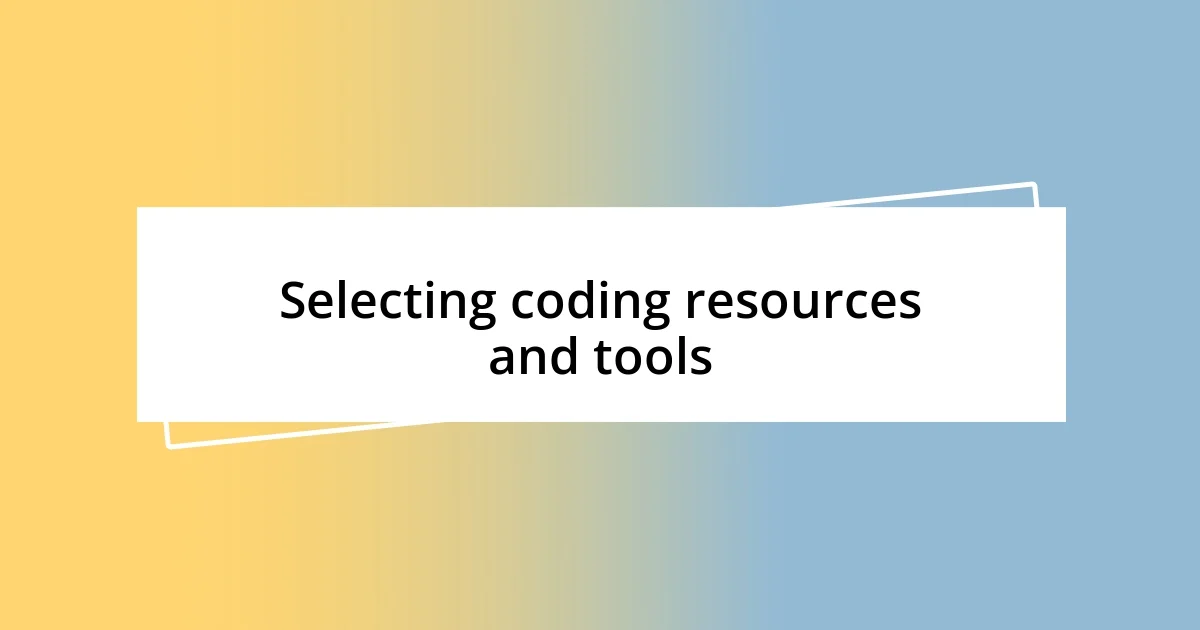
Selecting coding resources and tools
Selecting the right coding resources and tools is crucial for any aspiring coder. When I was starting out, I remember feeling overwhelmed by the sheer number of options available. Each time I saw a new course or a shiny new tool, it made me question whether I was using the best resource for my learning. I learned to prioritize resources that matched my learning style and the specific skills I wanted to develop.
Here’s a quick list of what to consider:
- Quality over Quantity: Instead of bingeing on numerous resources, select a few high-quality ones that fit your needs.
- Interactivity: I found that platforms with coding challenges or quizzes kept me engaged, making learning enjoyable rather than a chore.
- Community Support: Joining forums or groups related to the resource helped me connect with others, share challenges, and get feedback.
- Trial Versions: Take advantage of free trials to test if a platform resonates with your learning method before committing financially.
- Documentation: Good documentation is like a reliable friend; I always looked for resources that provided clear examples and explanations for coding concepts.
I still remember the joy when I stumbled upon a coding platform that fit my needs perfectly. It was designed to encourage hands-on practice with real-world projects, and the sense of achievement I felt after every completed task kept me coming back for more. Each small victory built my confidence and fueled my passion for coding, reminding me of why I started this journey in the first place.
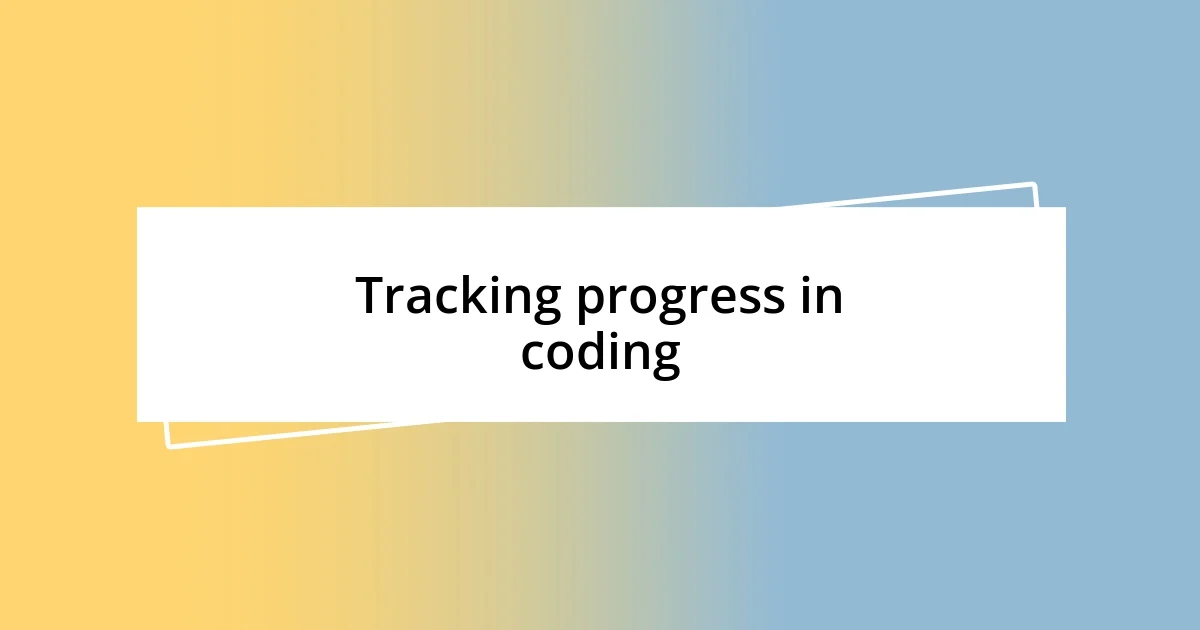
Tracking progress in coding
Tracking progress in coding has become one of the most rewarding aspects of my journey. I used to think coding skills were developed in a vacuum, but I discovered that reflecting on my achievements truly helps. For instance, I often revisit my old projects and compare them with what I can create now; the growth is tangible and satisfying. Have you ever looked back at your earlier work? It can be an eye-opening experience to see just how far you’ve come!
I began using coding habit trackers after realizing how easy it was to lose sight of my progress amidst the daily grind. Each day, I would check off tasks, whether it was completing a chapter in a coding book or finishing a project feature. The visual representation of my progress was like a map, guiding me through the coding landscape. One particular week, I challenged myself to learn two new functions in Python—it pushed my boundaries, but I felt a surge of happiness as I crossed each task off the list.
Another powerful method for tracking my progress was sharing my journey on social media. The feedback I received not only motivated me but also connected me with a community of like-minded learners. Sometimes, those words of encouragement felt like a virtual high-five, reaffirming my dedication to coding. Have you tried sharing your progress with others? It might just inspire you to keep pushing forward.
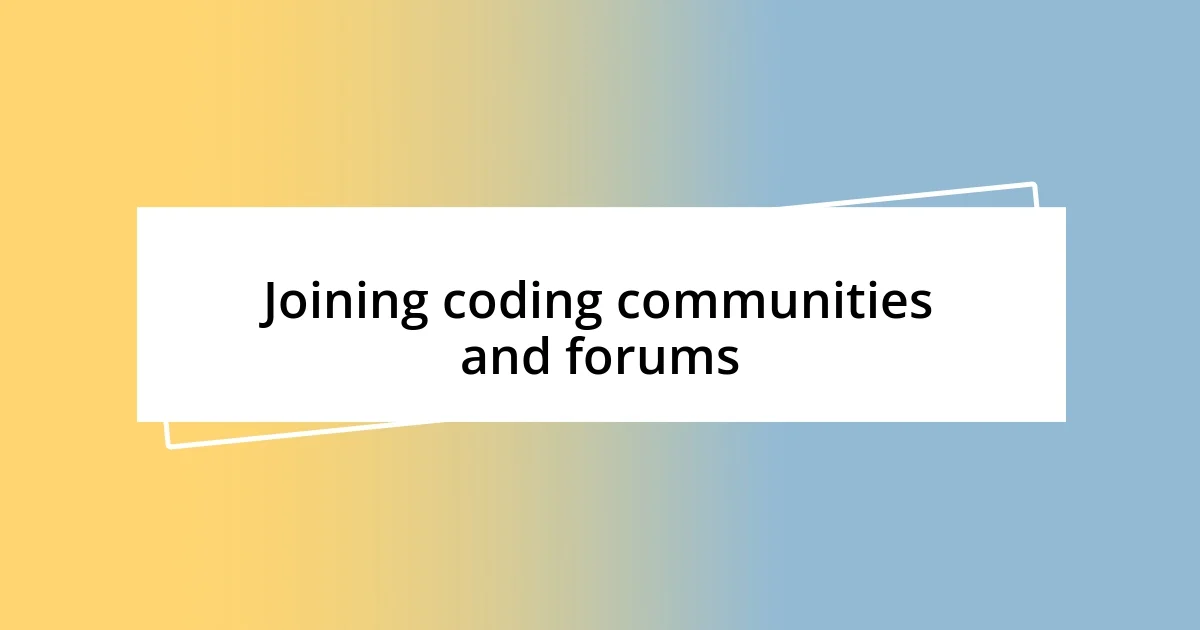
Joining coding communities and forums
Joining coding communities and forums played a pivotal role in my coding journey. I always felt like I was part of something bigger than myself when I engaged with others who shared similar interests. One of my favorite moments was when I participated in a coding forum challenge, and seeing others tackle the same problem in unique ways opened my eyes to different problem-solving perspectives. Have you ever experienced that realization that there’s no one “right” way to code? It’s both humbling and exciting because it invites collaboration and diverse ideas.
Being active in these communities allowed me to ask questions, learn from others, and share my knowledge too. I vividly remember the first time I helped someone troubleshoot a bug in their code; it felt like a mini-celebration. When you’re surrounded by passionate individuals, you can’t help but be motivated to improve. Plus, I discovered that many forums have coding meetups or study groups. It’s a fantastic way to meet people in real life who share your passion. Have you ever made friends through a mutual interest? It transforms the solitary aspect of learning into a vibrant social experience.
What I found especially rewarding was the mentorship that blossomed within these communities. I had a mentor who guided me through my first coding projects, offering invaluable feedback and encouragement. It’s like having a coach who helps you sharpen your skills and pushes you beyond what you think you’re capable of. Sometimes, all it takes is one person believing in you to unlock your potential. Have you thought about seeking a mentor in your coding journey? It can be a game-changer!
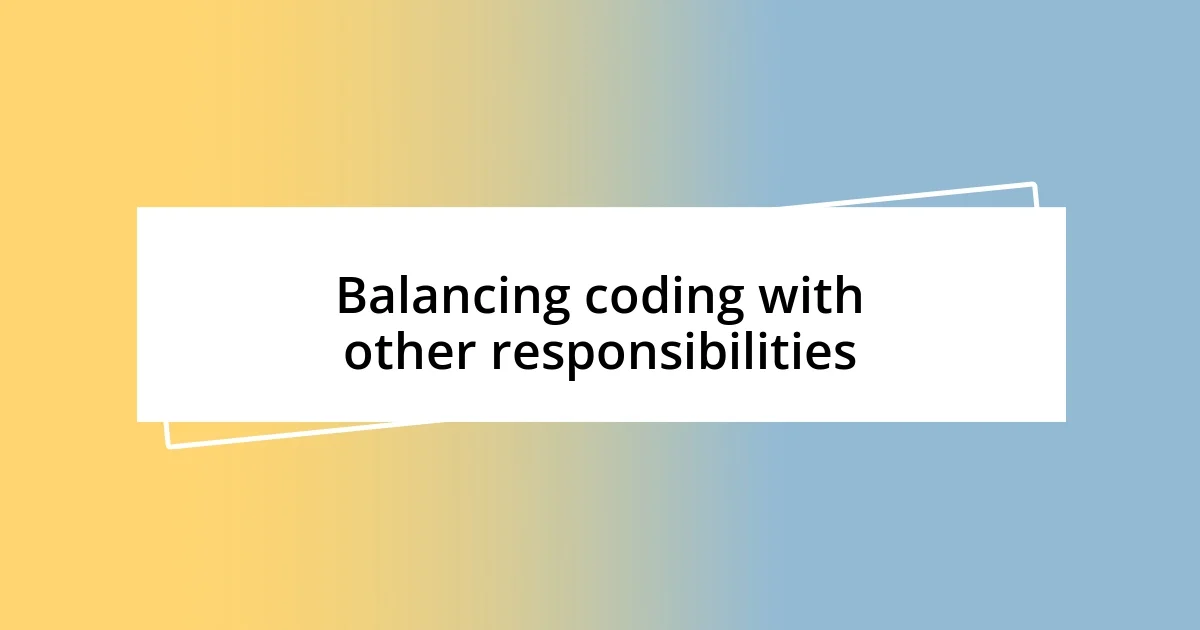
Balancing coding with other responsibilities
Balancing coding with other responsibilities can be challenging, but I’ve found it essential to maintain a flexible schedule. I remember one particularly busy week when work deadlines piled up, and I had to decide between staying up late coding or getting a good night’s sleep. I opted for the latter and felt so much better the next day. How do you prioritize your well-being while pursuing your coding goals?
Time management became my best friend as I tried to juggle coding with family commitments and my job. I often used the Pomodoro Technique, setting a timer for 25 minutes of focused coding followed by a short break. During those breaks, I would step away from the screen to check in with my family. This approach not only improved my productivity but also strengthened my relationships. Have you ever tried a structured method to blend your coding sessions with daily life?
One key insight I’ve gained is the importance of setting realistic goals. I used to overwhelm myself with ambitious targets, only to feel frustrated when I couldn’t keep up. Shifting to manageable tasks made all the difference. For example, instead of aiming to complete an entire project in one weekend, I focused on a specific feature each week. This not only made the journey less stressful but also gave me a sense of accomplishment without losing sight of my other responsibilities. What strategies do you employ to keep your coding practice sustainable alongside your life’s demands?







